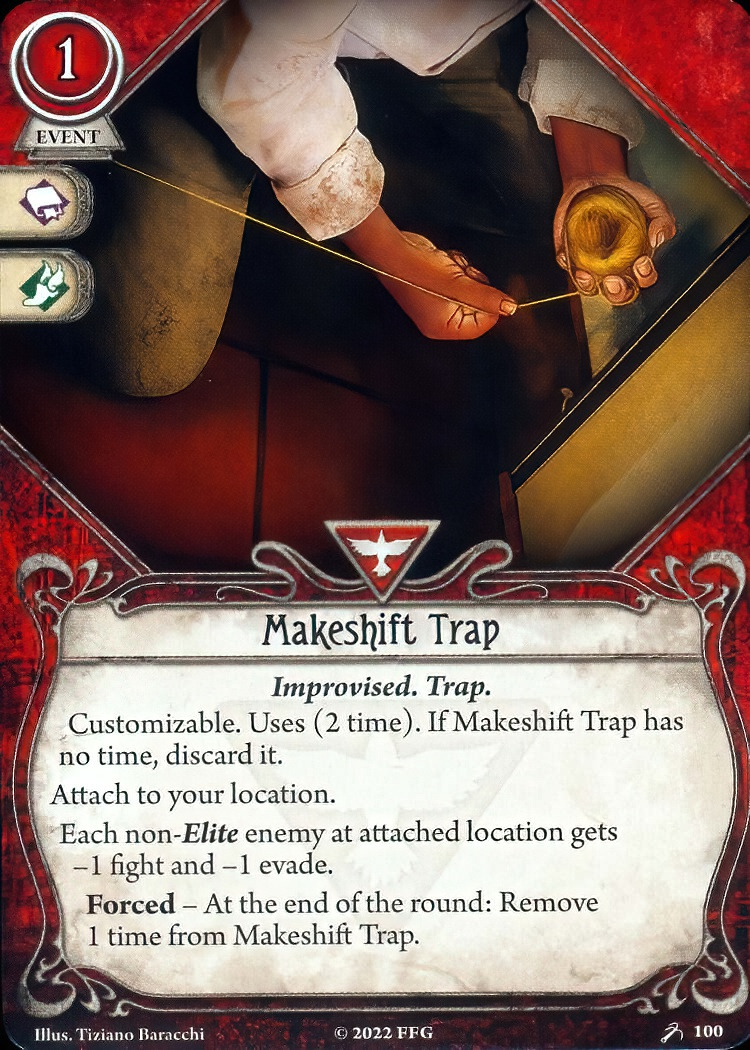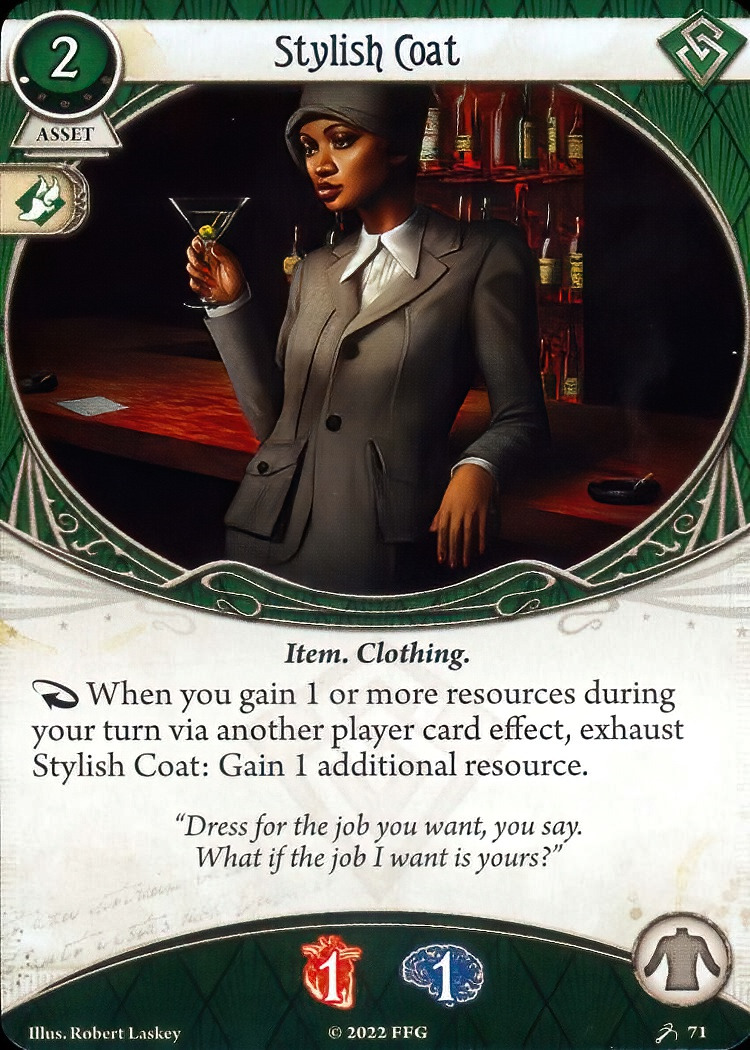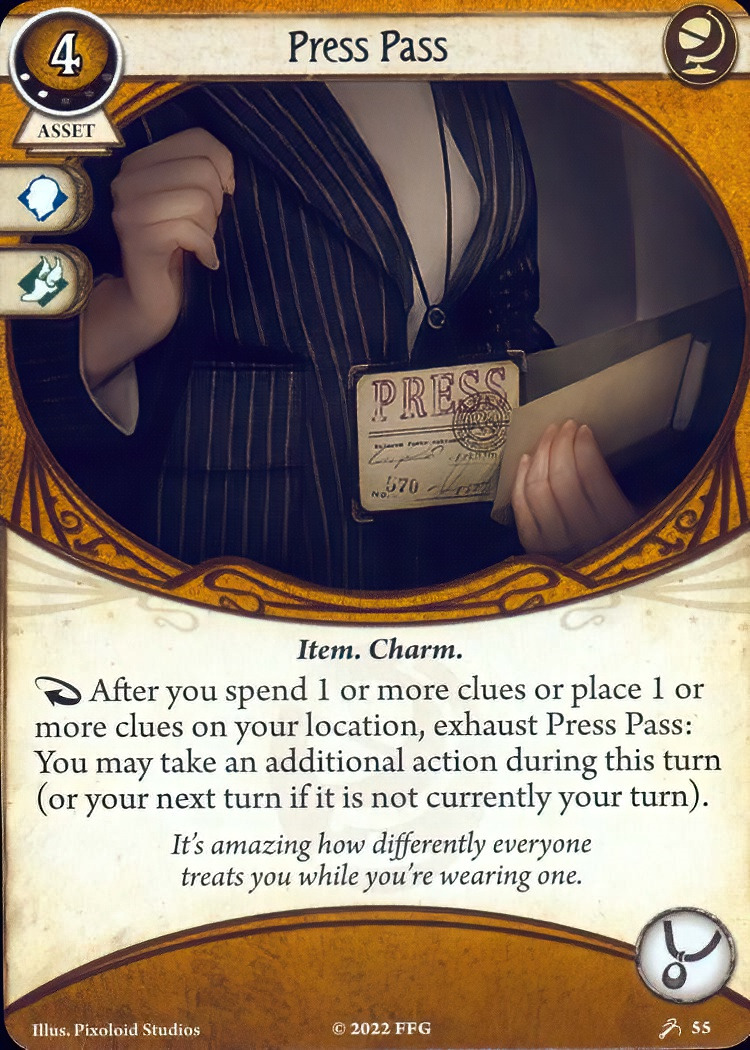
I am working on a Patrice Hathaway deck right now that uses the new difficulty 0 archetypes, and I am considering this card. I couldn't really make myself an opinion after 5 minutes of checking every option, so I thought I'd go for a deeper analysis of the possibilities offered by this card and share it here so that others can benefit from it too.
The Effect:
Enemies at your location are easier to evade/fight. This costs an action and therefore provokes attacks on opportunities.
The only way to make this card playable is then to plan on having an enemy at your location next turn. There are many ways to do so, including: Gloria Goldberg and her encounter deck manipulation, Parallel Fates, On the Hunt, Kicking the Hornet's Nest, Nine of Rods, First Watch, Scroll of Secrets, especially the one and we can go as far as mentioning Predator or Prey and hunter enemies.
The -1 difficulty makes it a good candidate for the difficulty 0 archetype. It synergises well with Impromptu Barrier and Flashlight (3) to bring down evasion tests to 0 and use Exploit Weakness.
Overall, as with some other customizable, this is an underpowered effect, and I doubt anyone will play this 0xp.
The Upgrades
-
□ Improved Timer:
- Increasing the timer increases the chance to play it on a location and see it used before it is discarded. It is interesting in combination with Net to gather more enemies at the same location and with Poisonous to deal more damage to enemies trapped.
- Decreasing the time, on the other hand, only synergises with Explosive Device.
-
□ Tripwire:
- Do not waste it anymore. This is super useful for making a landmine with Improved Timer and Explosive Device. Formidable against hunter enemies.
-
□□ Simple:
- Let's face it, Makeshift Trap actually costs 1xp since you will always want Simple. means no Attack of Opportunity while playing it, allowing you to keep it in hand and play it defensively.
-
□□ Poisonous:
- Adds DOT (Damage On Time) to your trap. It is half the experience of Explosive Device, doesn't attack allies but is much slower and does not have the AOE (damage to every enemy at the location).
- This will mostly see use in evading investigators as the damage is given after the Enemy Phase, and so you will not kill any enemy before you are attacked.
- To compare it: if it is Simple and Poisonous, you are paying 4xp to have a 1-cost Cheap Shot that wouldn't add your but just give +1 instead. That is quite bad...
-
□□ Remote Configuration:
- Attaching it to a revealed location doesn't bring anything by itself since you are usually evading/fighting enemies at your location. A few exceptions exist, like Marksmanship, Telescopic Sight, Springfield M1903, Onyx Pentacle and probably others, but I don't see this combo being used in any of these situations.
-
□□□ Net:
- If you have Simple, you can now play your trap and just move location, leaving any enemy behind. This also deals with hunter enemies.
- Add Poisonous and Improved Timer to deal with a 3-health enemy without spending an action other than the normal move.
- That makes the evade and fight bonus a little bit irrelevant as you can now just ignore enemies completely.
-
□□□□ Explosive Device:
- The flashy upgrade looks like Dynamite Blast but takes a lot of xp. The main disadvantage is that it explodes at the end of the round, so after the enemy phase.
The synergies:
-
The Dynamite Blast: Remote Configuration + Explosive Device_ + Improved Timer = 7xp
- Pros: 1 resource instead of 5, have less ways to deal great amount of damage than .
- Cons: Dynamite Blast is great for 0xp, but 3.5xp for the same effect, even cheaper, is too much to be worth it. If you add Simple, you get Dynamite Blast (3), which is not a great card and still costs +1.5xp per copy, and it doesn't explode before the enemy phase.
-
The Land Mine: Explosive Device + Improved Timer + Tripwire = 6xp
- Pros: it's fun to drop a 3-damage mine at one location. It becomes increasingly interesting if you know the scenario and can plan in advance where some enemies will spawn. It is great to deal with a hunter enemy while you need to move. Add Simple, and it works amazingly with Track Shoes, as you can drop it during the test triggered by the shoes. This last use is probably my favourite of them all.
- Cons: It is a rather big amount of experience.
-
The Net: Simple + Net + Improved Timer = 5xp
- Pros: Cheap and reactive way to protect yourself against enemies. It gives time to your enemy manager to potentially come and finish the job.
- Doesn't work on Elite enemies, so you'll need another way to deal with them.
-
The Remote Net: Net + Remote Configuration = 5xp
- Pros: Block hunter enemies. Protect a cluever from AoO and gives them time to move out.
- Con: Quite situational, and the customizable mechanic prevents you from only getting 1 copy.
-
The Poisonous Net: Net + Simple + Poisonous + Improved Timer = 8xp
- Pros: Deal with a 3-hp non-elite enemy , test less and for 1 resource. It can also trap other enemies. It helps your enemy manager with finishing the enemies trapped.
- Cons: It's a lot of experience for this.
-
The versatile bomb: Simple + Remote Configuration + Explosive Device_ + Improved Timer + Tripwire = 10xp
- Pros: This trap can be both a land mine and a remote bomb. As often run out of upgrades, that is a fun way to spend your extra experience points while creating more opportunities for yourself.
- Cons: Obviously, 10xp is a big ask for something that will not win you the game nearly as much as other 5xp cards will.
Who's that for?
So, now that we've seen some of the uses we can make out of this, the question becomes: who'd be interested?
-
Rita Young will like a Simple and Explosive Device trap as she can evade and leave the enemy behind or add an additional damage. Disguise also helps with leaving a hunter enemy in a Poisonous trap for a little longer. She can also spice it up with cards Bait and Switch (3) to bundle enemies.
-
Any investigator planning on using Flashlight (3) and Impromptu Barrier to use Exploit Weakness will appreciate a Simple trap. Patrice Hathaway will add Tripwire and just drop a trap as she'd drop an Open Gate when it arrives in her hand.
-
Any high that has the Track Shoes and is happy to drop a Land Mine and run away.
-
Patrice Hathaway can use Power Word to move enemies to the trap before it explodes and leave a Summoned Servitor at the location of a trap to evade the enemy and make sure that it stays until the grand finale.
-
Calvin Wright as a way to do a kamikaze device dealing 3 damage to himself as well as killing enemies in the process.
-
Minh Thi Phan and Preston Fairmont could have liked a Simple Net, but they cannot spend 5xp on it... There do not seem to be any 4xp combination that is worth considering for them or any other non-main .
Conclusion:
I think it's a bit of a miss with this customizable card. It could have a spot in the Difficulty 0 deck, but it takes a bit of XP to start being worth it, and the better upgrades hardly see any play at all. There are so many good cards nowadays that it's hard to justify a spot for the trap as is, but there is definitely a couple of investigators that could use it.
I wish the non-elite close were limited to Net and that Net did not prevent AoO while being 1 or 2xp instead of 3, making it usable for 0-2 access.




